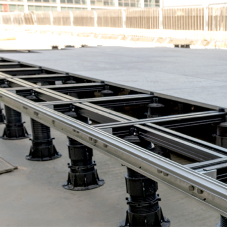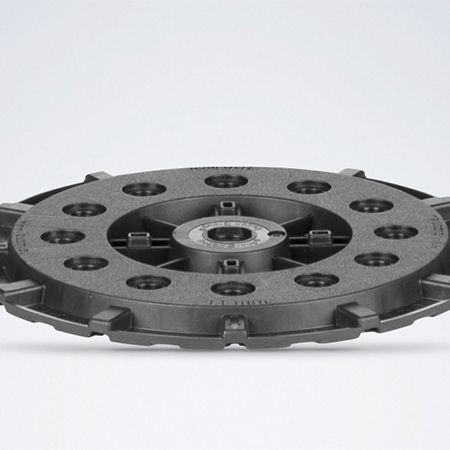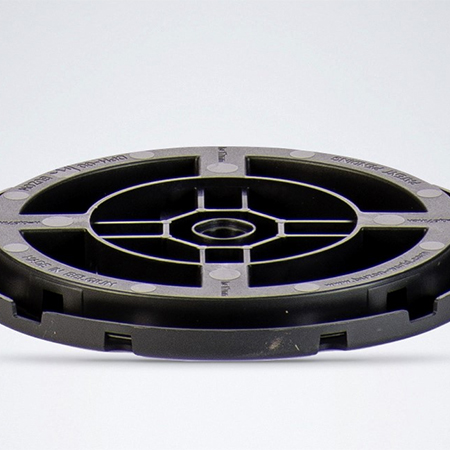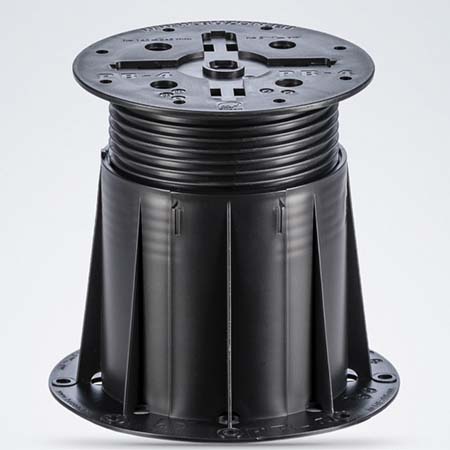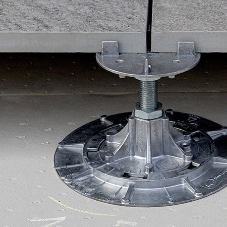Shims are a small component used on the head or base of a pedestal to provide an added level of stability, uniformity and comfort to your paved area.
Made from Styrene-Butadiene Rubber (SBR), they are flexible, cushioning and can be cut easily into smaller pieces where needed.
Whilst it is not a mandatory requirement to use shims, Buzon strongly advises their clients to use a 1 or 2mm shim per pedestal (at least), to remove any unwanted noise and discomfort whilst improving safety.
If you’d like to learn a bit more about shims, feel free to read Buzon’s in-depth post here.
Now, Buzon is going to look further at what happens when you don’t use shims on your external flooring projects.
The Flooring Area Can Become A Trip Hazard
When working with marble, granite or stone or even rectified porcelain, you may find you need to compensate for different thicknesses in the tile that naturally occur, mostly in un-treated materials but imperfections may also be found in man-made products.
Different thicknesses in tiles and pavers can cause unevenness in your flooring, presenting a trip hazard. In this instance, a shim* is a suitable accessory to even out the surface of your flooring to avoid any accidents.
Not only is this an accident waiting to happen, but it also looks unsightly.
*note: shims can be stacked in multiples up to four to create additional height as necessary.
The Flooring May Be Noisy Underfoot
Due to the absorbance of the SBR, shims can provide necessary sound dampening between the head of the pedestal and the surface material. Without a shim, users may encounter noise as the surface presses again the pedestal head when it is walked across.
Whether from foot traffic or outdoor furniture, floors bear the brunt of impact within your building. The sound energy generated by this impact can be transmitted through the structure of your building, distorting noise and disturbing workers, guests or residents. Shims have been designed, in part, to insulate noise, preventing its transmission from your flooring to surrounding areas of the building.
It May Not Be As Comfortable To Walk On
In a similar way to aiding acoustic comfort, shims can provide an element of comfort to those walking on the flooring. The cushioning will help the flooring to feel softer underfoot, absorbing any impact that may occur.
It may be easy to overlook this subtle detail, but user comfort and experience is an important part of the overall design.
Conclusion
Shims are a simple solution to a number of problems faced in the installation and usage of an external floor area.
As mentioned before, Buzon always advises their clients to use a 1 or 2mm shim on every pedestal for a tiling installation (at the very least). But Buzon can provide additional advice and support when the time is right for you.
Want to find out more? Speak to one of their experts on +44 (0)20 8614 0874. They’re always happy to help.
What Happens When You Don’t Use Shims With Paving?
| T | 020 8614 0874 |
|---|---|
| F | (020) 8977 0825 |
| E | info@buzonuk.com |
| W | Visit Buzon UK's website |
| Unit 6, Teddington Business Pk, Station Rd, Teddington, Middlesex, TW11 9BQ |
Products by this Company



